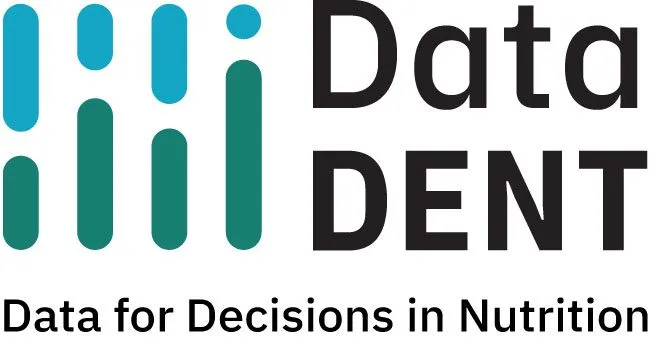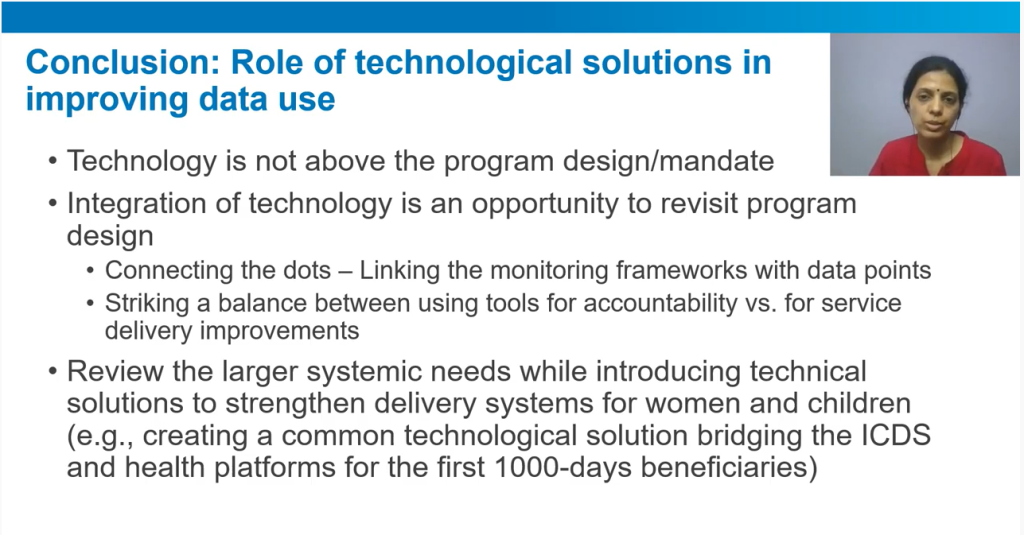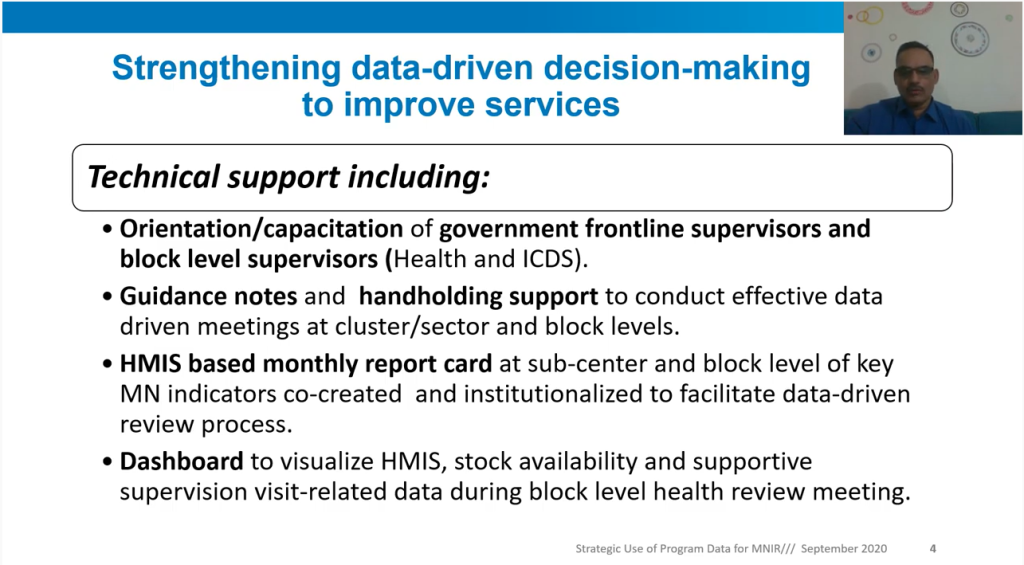To strengthen nutrition information systems and improve nutrition outcomes in India, we must improve data quality and facilitate the use of data at all levels. This was the theme of one of the key thematic sessions at ‘Delivering for Nutrition in India: Insights from Implementation Research 2020’, a virtual event co-hosted by Partnerships and Opportunities to Strengthen and Harmonize Actions for Nutrition in India (POSHAN) and 19 partners on 15-18 September 2020.
IFPRI Program Manager Manita Jangid provided an overview of the India nutrition indicator framework, co-developed by DataDENT, POSHAN, IFPRI, NITI Aayog, and IDinsight, to introduce the “Systems Strengthening: Using Data to Improve Programs” session. She shared how the framework enables monitoring at the national and sub-national levels and promotes the use of data from multiple sources.
View Ms. Jangid’s slides here.
IFPRI Research Fellow Rasmi Avula presented study findings on how an m-health intervention has the potential to alleviate constraints in using administrative data systems by enabling the automation and digitization of reporting mechanisms, and facilitating real-time access to data. However, the study found that the review and use of data were not different in the intervention and comparison areas. This suggests that technology can bring in efficiencies, but it functions within the confines of the program design.
View Dr. Avula’s remarks here.
Alive & Thrive Senior Advisor for Monitoring, Learning and Evaluation Vishal Shastri shared experiences on how strategic use of program data was critical in improving the implementation of maternal nutrition interventions delivered during antenatal care in Uttar Pradesh, India. Drivers of effective data use were capacity building of frontline workers, use of checklists, guidance on data use, and the utilization of an Health Management Information System (HMIS)-based scorecard at block and sector levels. Strategic use of data is critical to facilitate action, improve functioning and increase ownership among frontline workers.
View Dr. Shastri’s remarks here.
Sharing insights of data driven governance, NITI Aayog Data Scientist Rama Kamaraju talked about how technology driven data monitoring facilitates the effective governance and implementation of the Aspirational District Program. To track comprehensive progress across sectors in Aspirational District Program, NITI Aayog developed the Champions of Change dashboard, a data visualization tool which plays a critical role in data driven strategy for resource planning and decision making. Key focus areas to improve data use include: data quality assurance, alerting outliers, empowerment efforts through data visualization tools, customized reports, analysis, and use of experimental tools.
View Dr. Kamaraju’s slides here.
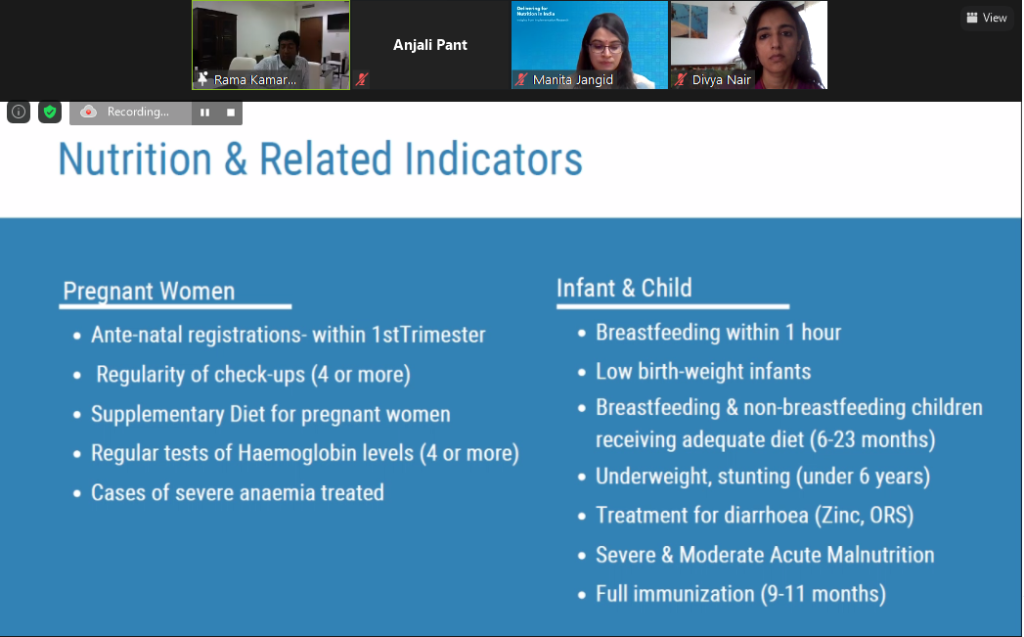
IDinsight Director Divya Nair pointed out that systems issues—such as difference in service area boundaries for frontline workers, different reporting formats, hardware and software challenges, vacancies, and data literacy—hinder data use and identified ways we can address those issues at the village level. Key takeaways highlighted the need for innovative technologies to improve data collection (e.g. geo-spatial mapping to understand service boundaries), capacity building for frontline workers around data use, and advocacy efforts to foster the political, social, and capital will needed to make changes to strengthen existing systems.
View Dr. Nair’s slides here.
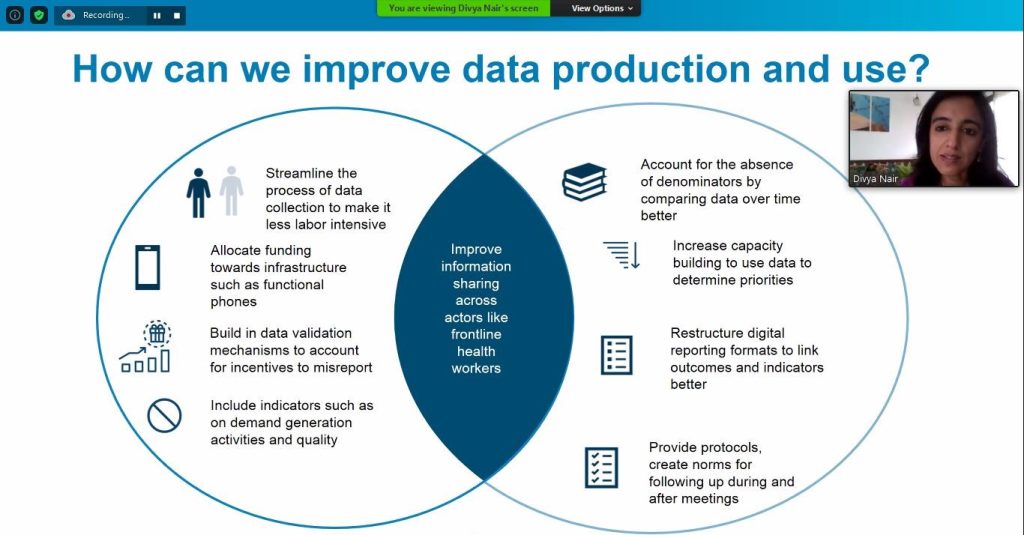
During the panel discussion, speakers shared their experiences and responded to participants’ questions. Key messages included: 1) there is an urgent need to prioritize, reconcile and synthesize data and innovations at different levels due to the multiple data sources available for health and nutrition interventions in India; 2) the data prioritization process needs strategic thinking on what gets measured and what gets managed and by whom; 3) COVID-19 has renewed the focus on data prioritization and standardization of key indicator definitions and functioning; 4) data quality remains a big issue, irrespective of data availability; 5) efforts are needed to improve health and nutrition infrastructure, validation checks, incentives, automation, skills of frontline workers and functionaries at different levels; and 6) we must continue advocacy efforts to address system structural issues at all levels
Alignment with DataDENT activities
DataDENT’s overall aim is to strengthen the nutrition data value chain. By improving the collection and use of nutrition data, DataDENT believes that strong nutrition information systems are crucial to reducing malnutrition and reaching nutrition targets in India. In May 2019, DataDENT in collaboration with NITI Aayog, IDinisght, and IFPRI POSHAN project developed a National Nutrition Indicator Framework that reflects POSHAN Abhiyaan, India’s National Nutrition Mission priorities. Building on the framework, DataDENT continues to work on prioritization of indicators to support harmonization of data across nutrition stakeholders. In February 2019, DataDENT completed a study on data visualization tools for nutrition in India, which is published. DataDENT continues to engage and discuss study recommendations that producers could act upon to further improve their tools to support decision-making. For instance, the Champions of Change Dashboard was developed and is managed by NITI Aayog and study findings are being integrated in an upgraded version.
